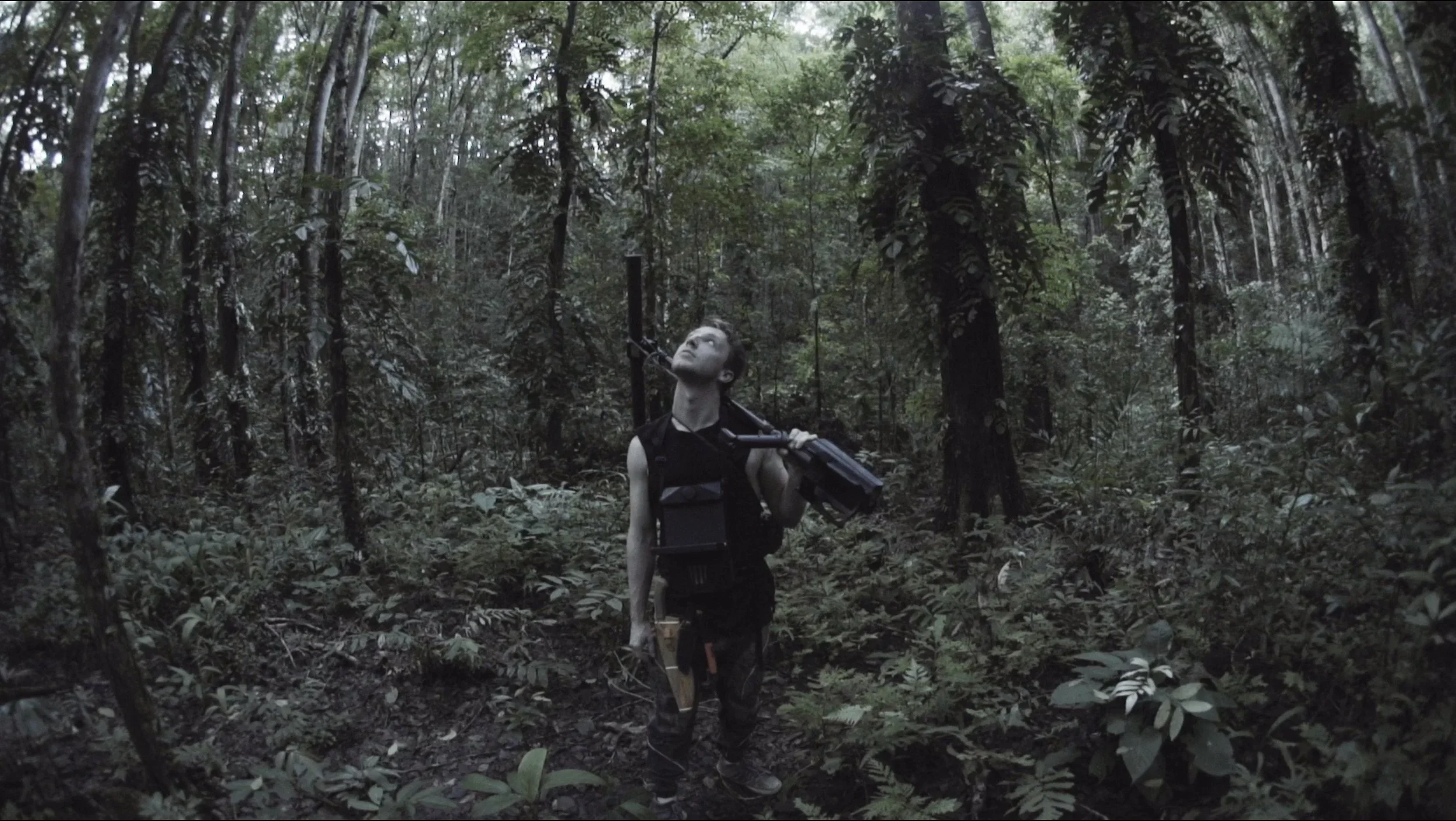‘Maple Leaf Dreams’ REVIEW: Same Old Drama
‘Maple Leaf Dreams’ REVIEW: Same Old Drama
Macky (LA Santos) hands Mollie (Kira Balinger) a maple leaf near the shore with the Toronto cityscape in the background | Photo taken from the film’s trailer on YouTube
As long as Filipinos continue to pack their luggage to work abroad, films tackling the Overseas Filipino Worker (OFW) experience will continue to resonate.
It’s a sad reality that Filipinos are incentivized to leave due to the exploitative systems that make upward mobility nearly impossible. Filipinos are often raised by their own government to become laborers who can work outside of the country, and the economy relies on remittances from OFWs to sustain itself. We all know at least one person who took a huge gamble outside their homeland to provide a better life for their family, even at the cost of being separated from loved ones. For some of us, we are that loved one.
These stories have become so prevalent that they are embedded in our culture and society. One way this is evident is through films based on the OFW experience, which has become a genre unto itself. These films cover either the workers or their families and the effects on both parties.
There is still a clear hunger for these stories: The romantic drama Hello, Love, Goodbye, about two OFWs in Hong Kong starring Kathryn Bernardo and Alden Richards, became the highest-grossing Filipino film of all time at its release. Its sequel, Hello, Love, Again, set in Canada, is due in November this year, and the excitement around its release might allow it to claim the box-office record its predecessor set.
Maple Leaf Dreams, as the title suggests, is also set in Canada and precedes the much-anticipated sequel by a few months. None of this is a competition, of course. There is room for both films as they contribute to a larger canon, reflecting the country’s struggle with a corrupt, ineffectual government, its colonial history, and the diaspora it generates.
Mollie (Kira Balinger), her father (Joey Marquez), her mother (Snooky Serna), and her sister (Hannah Thalia Vito) crying and hugging after a critical moment | Photo taken from the film’s trailer on YouTube
Macky and Mollie, played by LA Santos and Kira Balinger, respectively, face a decision millions of Filipinos have made before them. The two are college sweethearts who have not found the success they dreamed of as working adults. Macky is a restaurant manager, while Mollie works as a secretary for her cousin. Both come from families who get by but must be resourceful.
Mollie’s situation is trickier: they are indebted to wealthy relatives who funded Mollie and her sister’s education. Mollie works for her cousin, and her father (Joey Marquez) is a driver for her rude uncle, who belittles him over the smallest mistakes.
Mollie’s had enough. She doesn’t believe their lives will improve by staying in the Philippines, so she decides to emigrate to Canada with Macky. Macky agrees to follow her. Her family is reluctant, especially her mother (Snooky Serna), a former OFW who chose to stay home out of concern for her family. However, her father is supportive, agreeing that their family has endured enough subservience. He even gives up his savings — intended for an auto repair shop — so Mollie and Macky can cover the costs of their Canadian visas and have funds to sustain them for a few months. With that financial obstacle cleared, they migrate to Canada to start building new lives together.
What follows is a melodrama with just the right amount of cheese, aiming to show what life is like for OFWs in Canada, centering on two underdogs whose love will be tested and strengthened in a foreign land. It’s a story larger than the couple themselves, as they embody the warmth, resilience, and supportiveness of the Filipino-Canadian community. Written and directed by Benedict Mique, with co-writer Hannah Cruz, the film is sweet and genuine in its intentions. It pushes for optimism and the spirit of bayanihan in a tale that represents a common, quiet tragedy for ordinary Filipinos. This contrasts with other Sinag Maynila entries this year, which are darker and tackle weightier issues. However, despite a likable cast and sincere intentions, Maple Leaf Dreams fails to dramatize familiar material compellingly.
Macky (LA Santos) comforts Mollie (Kira Balinger) as she cries on the sidewalk late at night | Photo taken from the film’s trailer on YouTube
The cast does much of the heavy lifting to make the film more engaging. Joey Marquez and Snooky Serna are familiar in their roles as the goofy father with crude humor and the concerned yet loving mother. Hannah Thalia Vito rounds out Mollie’s family as her younger sister, who would rather work than study. The film does nothing new with these archetypes, but the actors’ performances create a warm family dynamic that adds depth to Mollie’s story. Macky and Mollie feel like younger versions of Mollie’s parents — even giving Macky a penchant for dirty jokes — but LA Santos and Kira Balinger carry the film on their own terms, portraying a clear concern and affection for each other that makes them worth rooting for.
What holds the film back is its delivery. The story stresses the hardships faced by Canadian OFWs, but it does so clunkily. Characters speak in unnatural dialogue, explaining everything they’re experiencing. Sometimes this has a narrative purpose, like Mollie’s vlogs or video calls with her family, but the film never misses a chance to turn a scene into a lesson, creating a distance from the characters we’re supposed to empathize with and detracting from more effective, introspective moments.
Even the story feels like a collection of scenes, tied together only by common Canadian OFW experiences. This is more apparent in the first half, where Macky and Mollie try to settle in Toronto, facing issues like racism, homesickness, and strain on their relationship. The film raises these issues but quickly moves on, lacking natural progression and the texture to enhance the story or its characters. Focusing solely on the topics dulls the emotional impact.
Macky (LA Santos) cries after a stressful event | Photo taken from the film’s trailer on YouTube
An example is a fight between Macky and Mollie when Mollie is angry at Macky for not wiping the toilet seat after using it. Both are clearly stressed from juggling responsibilities without rest, so small grievances snowball into a shouting match. It’s a well-shot scene, done in a single take, with Macky and Mollie in different rooms but both visible, highlighting their growing distance. The argument is well-written, avoiding the script’s usual flaws, and Santos and Balinger give it their all, making it feel like an overheard relationship-breaking fight.
However, the film doesn’t build up to this moment. We don’t see the events that lead to this argument or how the pressures of their new life have strained their relationship. This lack of buildup is symptomatic of the film’s overall flaws; it fails to create a compelling narrative rooted in who Macky and Mollie are as people.
This issue becomes more apparent in the second half, with a dramatic turn that tests their relationship’s limits. The third act, rushing toward a happy ending, feels eye-rollingly cloying rather than triumphant.
Mollie (Kira Balinger) is sad and distracted in the middle of class | Photo taken from the film’s trailer on YouTube
Ironically, one of the best scenes has little to do with the story. Real-life Canadian OFWs are integrated into the film, with Macky finding a job at the Filipino restaurant Wilson’s Haus of Lechon thanks to its owner, Wilson Martinito, who shares his experiences. At one point, a spotlight shines on several OFWs who share their tough yet rewarding journeys in talking-head interviews. This direct portrayal puts a face on the struggles of Canadian OFWs, delivering a more poignant impact than the scripted moments.
It’s a genuinely touching scene that hits the tone the film aims for — ironically, outside of its main story. Santos and Balinger are charming, but Macky and Mollie feel like hollow avatars for the OFW experience compared to the real thing. The film’s reverence for OFWs turns it into a lecture rather than tapping into raw, emotional truths, making it hard to buy into the Maple Leaf Dreams it’s selling.
‘Maple Leaf Dreams premiered on September 4, 2024 as part of the 6th Sinag Maynila Independent Film Festival under the Full-Length Feature category.


















